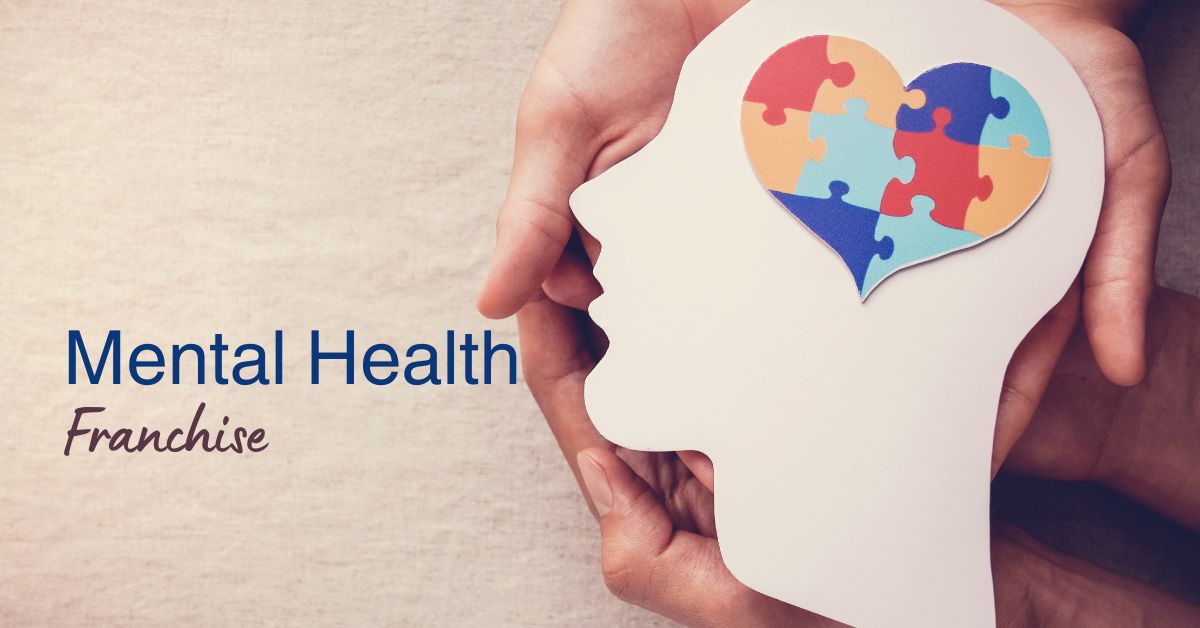Mental health has become an increasingly important topic of discussion. The rising awareness has led to a surge in demand for medication management services and support.
This growing demand has given rise to mental health franchises,offering potential business opportunities for entrepreneurs interested in making a positive impact while seeking financial success.
In this article, we will delve deep into the world of mental health franchises, exploring the risks and rewards associated with such ventures.
Understanding the Mental Health Landscape
It is crucial to understand the current mental health landscape. The world is witnessing a significant increase in mental health disorders, ranging from anxiety and depression to more severe conditions like bipolar disorder and schizophrenia.
Additionally, according to a report from the World Health Organization, depression has emerged as the leading cause of disability worldwide.
Furthermore, approximately 1 in 4 American adults experience a diagnosable mental health disorder, with 1 in 10 individuals affected by a depressive illness like major depression or bipolar disorder (Johns Hopkins).
However, it is crucial to acknowledge the growing focus on mental health awareness and support. Numerous local and state organizations are diligently working to educate the public about mental health issues and provide them with access to high-quality services.
For entrepreneurs interested in mental health, understanding the existing challenges and opportunities is essential.
The Rise of Mental Health Franchises
Amidst the growing demand for mental health services, the concept of mental health franchises has gained traction in recent years. Moreover, these franchises aim to provide accessible and localized mental health treatment and support to communities while following established guidelines and procedures set by the franchisor.
By opting for a franchise model, mental health practitioners can tap into an existing brand. In Addition, they can gain support in terms of marketing and operational setup, allowing them to focus more on delivering quality care.
Evaluating the Risks of Mental Health Franchises
Mental health franchises come with both risks and rewards. On the one hand, they offer a great opportunity to make a positive impact on people’s lives while also potentially achieving financial success. However, this potential comes with considerable risk.
On the other hand, franchises in the mental health sector are subject to various regulations and restrictions, depending on the jurisdiction. This means that entrepreneurs must be mindful of local legislation when setting up their businesses, as failure to comply could lead to severe penalties or even closure.
Furthermore, there is no guarantee of success with any franchise, so future owners need to do thorough research and have a realistic assessment of their prospects.
Advantages of Mental Health Franchises
Established Brand Identity: Joining a mental health franchise means becoming a part of a brand that has already established its presence and credibility in the mental health market. Consequently, this can significantly reduce the challenges associated with building a brand from scratch.
Training and Support: Franchisors often offer comprehensive training and ongoing support to their franchisees. Consequently, this can be invaluable, especially for individuals new to the mental health industry or those transitioning from different sectors.
Moreover, no prior mental health experience needed or to be a licensed mental health clinician, the extensive training program will help you to become a successful franchise owner.
Access to Resources: Mental health franchises can provide access to resources, tools, and technologies that might be expensive or challenging to acquire independently. As a result, this ensures that franchisees can offer the latest and most effective treatments to their clients.
Community Impact: By joining a mental health franchise, entrepreneurs have the opportunity to make a positive impact on their communities. Additionally, they can address the pressing mental health needs of their local population and help reduce the stigma surrounding mental health.
Business Guidance: Franchisors often have a proven business model that franchisees can follow. Consequently, this guidance can streamline various aspects of running the franchise, including marketing, pricing, and client acquisition.
The Risks Involved

While mental health franchises offer numerous benefits, it’s essential to acknowledge the risks involved before making a significant investment. These risks include:
Initial Investment: Joining a franchise typically requires a substantial initial investment, which can be a significant barrier for some aspiring mental health practitioners.
Franchise Fees and Royalties: Franchisees are obligated to have franchise costs and pay ongoing fees and royalties to the franchisor, impacting their bottom line.
Dependency on Brand Image: While an established brand can be an advantage, it can also lead to dependency. Negative publicity or issues with the brand’s reputation may affect individual franchises’ success.
Competition: Mental health franchises face competition not only from other franchises but also from independent mental health practitioners and healthcare facilities.
Flexibility and Autonomy: Franchisees might have to adhere to strict guidelines and protocols set by the franchisor, limiting their flexibility and autonomy in decision-making.
Factors for Consideration When Investing in a Mental Health Franchise
Investing in a mental health franchise can be financially and emotionally rewarding, but careful consideration of factors is crucial for long-term success.
As a potential investor, it’s crucial to take the time to assess the following key elements:
Thorough Market Research
Before starting a mental health franchise, it’s crucial to do careful research. First, know how many people in your area might need mental health services.
Look closely at things like:
- the types of people living there,
- what they need from a mental health service,
- what they like,
- and who else is offering similar services nearby.
This information will help you make mental health services that fit what people in your area exactly need.
Discover local mental health issues, preferred treatments, and well-being supports to tailor services, making your business more appealing.
Franchisor Reputation
Examine the franchisor’s track record, including past franchisee performance and overall success. Additionally, check the support levels and any brand controversies.
Furthermore, a reliable and reputable franchisor is known for offering consistent and continuous assistance.
To gain a comprehensive understanding, dig deep into the history of the franchisor’s operations and the experiences of those who have previously been part of the franchise network.
Assess the support structure in place for franchisees, including:
- training programs,
- marketing assistance,
- operational guidance,
- and any ongoing support mechanisms offered.
It’s equally important to inquire about any past or existing controversies related to the brand, as this can impact the reputation and stability of your own franchise business.
Legal and Financial Considerations
Get help from a good franchise lawyer who can review the franchise agreement.
They’ll explain what you’re entitled to, what you have to do, and any risks in the agreement, giving you a clear picture of the principal legal stuff.
Additionally, conduct a thorough analysis of all franchise-related expenses. Evaluate the various costs involved, such as:
- the initial franchise fee,
- real estate,
- equipment purchases,
- and ongoing operational costs.
By analyzing these costs against potential returns, you can better understand the financial viability of your investment.
Consult financial experts for guidance on franchise investments. They can help create financial projections and assess the potential profitability of your venture.
Training and Support
Assess the franchisor’s training programs, especially if you’re new to the mental health industry. Thorough training is vital to acquire the skills and knowledge required for successfully managing your business.
Consider aspects such as:
- the depth of training offered,
- accessibility of resources,
- and the ongoing support available.
Look for programs that cover essential areas such as:
- operational management,
- client care,
- marketing strategies specific to mental health services,
- and any unique aspects of the franchise's operation.
A dependable franchisor support system is vital for success. Training programs should meet your needs.
This support doesn’t just boost your confidence; it also empowers you to deliver outstanding services to your clients, enhancing their experience and satisfaction.
Passion for Mental Health
Beyond the financial considerations, investing in a mental health franchise requires a genuine passion and a strong desire to help others.
Mental health services can be emotionally demanding. People’s lives will be instrumental during challenging times.
This passion will drive your dedication to the business, motivate your team, and create a supportive and compassionate environment for your clients.
Investment
Investing in a Mental Health Franchise involves certain financial considerations. One notable difference compared to starting an independent business is that a significant portion of your initial investment is allocated to the franchisor as fees for various elements like:
- training,
- equipment,
- and licensing rights.
These fees may vary considerably, ranging from a few thousand dollars to several million.
Analyze what the franchise company offers in return for these fees. Evaluate the comprehensive package they provide, including:
- training programs,
- support systems,
- brand reputation,
- marketing assistance,
- operational guidance,
- and ongoing resources.
Assess the value of these offerings and consider how they align with your business goals.
Also, evaluate the time to recover your initial investment costs. Examine the franchise’s track record, average franchisee performance, market conditions, and local demand for mental health services.
This evaluation will help gauge the franchise as a worthwhile investment.
Restrictions
Owning a Mental Health Franchise comes with specific restrictions imposed by the franchisor. These guidelines typically dictate how the franchise operates, encompassing various aspects such as:
- product offerings,
- pricing structures,
- operational hours,
- and store aesthetics.
The franchisor usually holds significant control in ensuring consistency across all franchise locations. This control helps keep the brand consistent and ensures customers get the same experience everywhere.
Before committing to a mental health franchise, ensure you’re comfortable with its restrictions. Consider adhering to the franchisor’s guidelines since it significantly influence your day-to-day operations.
Competition
When evaluating a franchise, especially a well-known brand like Ellie Mental Health and Nora Mental Health Clinic, offering medication management services, it’s crucial to consider the number of existing franchisees in the vicinity and the intensity of competition from similar businesses.
Take into account the:
- specific demographics,
- consumer preferences,
- and economic conditions of the area.
Assess whether the chosen franchise aligns with the market demands and if its products or services fill a unique gap or offer a competitive edge.
Considering factors like:
- location,
- target audience,
- and the differentiation strategy of the franchise is pivotal.
It’s essential to have a clear plan to stand out amidst competition, whether through exceptional customer service, distinct offerings, or a unique marketing approach.
This assessment can help overcome challenges in entering a competitive market like Nora Mental Health Clinics or Nora Mental Health family, securing a stronger position for the franchise in the long run.
The Franchise Disclosure Document (FDD)
When it comes to the Franchise Disclosure Document (FDD), allocating time to review this document is crucial once you reach this stage in the purchasing process.
Additionally, it encompasses audited financial information and adheres to regulations in various states mandating its filing. Moreover, this document is a repository of meticulously detailed, impartial data about the franchisor.
Most franchisors typically conduct an FDD review call with prospective buyers.
By weighing these factors, you can position yourself for success in the mental health care industry, mirroring the achievements of franchises like:
- Nora Mental Health franchise or Nora Mental Health fills
- and Ellie Mental Health franchise.
This approach ensures a gratifying and fulfilling journey within this business realm.
Final Thoughts

Deciding to invest in a mental health franchise is a significant choice that necessitates proper contemplation and extensive research. It is not mandatory to have a license as a mental health clinician.
By assessing the different aspects involved, comprehending the potential risks, and having a strong dedication to mental health, entrepreneurs can establish profitable franchises that positively impact their local areas.
With the right mindset and resources, mental health industries can be incredibly rewarding both professionally and personally. It is essential to take the time to ensure you choose the right franchise for your goals and ambitions, as it could be the start of a lifelong career helping those in need.
If you are considering starting a franchise, it could be advantageous to consult with Adam Goldman, a franchise expert with over a decade of experience. Goldman has assisted numerous individuals in locating the ideal franchise for their needs and can offer valuable guidance throughout the process.
With his assistance, you can be confident in making a decision that will pave the way for success and ensure that your venture is both fulfilling and lucrative.
Don’t hesitate to reach out today and begin your journey toward owning a mental health franchise – there’s no better time to start!

